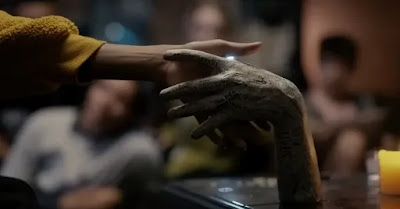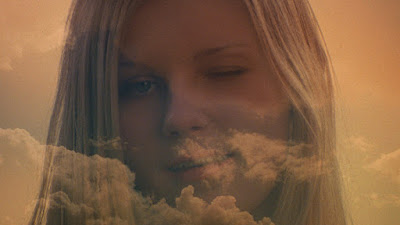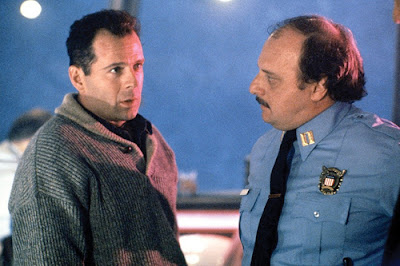The final Indiana Jones movie - or, more likely given Hollywood's current runaway mining cart of thought, the last Indiana Jones movie to feature Harrison Ford in the lead role - has the advantage of being delivered to cinemas by seasoned hands in the immediate wake of The Flash. For everything that dud got wrong, Indiana Jones and the Dial of Destiny gets something at least partway right; its instincts are good, even when its material really isn't up to much. It behoves you to get to your seat early, because its very best material has been placed upfront: a self-contained 25-minute prologue - by some distance the best Indiana Jones movie anybody's made for a good three decades - in which a digitally de-aged Ford hauls sidekick Toby Jones (and his cherishably unruly tufts of hair) away from Nazis, across the roof of a moving train, and into an optimistic post-War dawn. Though it clings stubbornly to the modern blockbuster palette - somewhere between one- and two-thirds drearier than these things were circa 1981's Raiders of the Lost Ark - it has suspense and momentum and that rare, precious blockbuster wit that occasions a double chuckle: when you catch yourself laughing at some quip or near-miss, and giggle all over again at how a big dumb movie has suckered you. Fade to black. When the film recommences, we find ourselves in more conventional legacy-sequel territory, pondering the kind of writers-room spitball that has opened many a tightly guarded studio chequebook over the past decade. What if Indiana Jones had lived until the late 1960s, long enough to see himself become one relic among many at a New York university's archaeology department, Beatles-loving longhairs swamp his apartment block, a man put on the Moon, and Nazis re-emerge as just as big a threat as they were back in his youth?
This isn't the worst question the movies have asked in recent years, not least as it provides a whole new context for that air of cranky impatience that has dogged Ford ever since The Empire Strikes Back - an actor's awareness that existence means having to refight battles you thought were long won. (Hey, Indy: welcome to 2023.) His director here is James Mangold, who doesn't have Spielberg's mastery. (Who does?) Yet since emerging from the indie scene of the 1990s (Heavy, Cop Land), Mangold has successfully merged plot and character with crowdpleasing action (Logan, Le Mans '66). He has at least a facility around setpieces, demonstrated here in a nimble choreography of bodies within the frame, and a marked preference for tangible production design and analogue stuntwork over empty digital wizardry. Those early Indy movies weren't just an homage to the serials and comic strips of their maker's youth - they were also, for a long while, the closest American film got to the thrills and spills of the Bond franchise. That parallel is sustained and extended here by the casting of Mads Mikkelsen, Casino Royale's notorious Le Chiffre, as Nazi-in-chief Dr. Voller, obsessive-to-murderous in his pursuit of the titular Archimedean doohickey; one thematic model for Dial of Destiny - which opens to the sound of a clock ticking, and leans heavily into the idea this might be a hero's last stand - was clearly 2021's nostalgic-elegiac No Time to Die. The problem is that this raises a second question (what if we made an Indiana Jones movie in the 21st century?), and answering that requires everybody involved to disregard the evidence provided by 2008's Indiana Jones and the Crystal Skull - namely that it might have to involve Shia LaBeouf, and might not be all that memorable, in the vast Archimedean scheme of things.
So what does a 21st century Indiana Jones movie look and feel like? Two-and-a-half hours, to give the illusion of an event or value for money. A staggering budget (reportedly between $250-300m) that enables all manner of globeplodding, and a frantic setpiece every twenty minutes, even if there's no particular narrative reason for a setpiece. It is more exhausting than exhilarating this time round; it is at once too much and not enough, both heavy-going and flimsy-thin. One of the reasons people have drifted away from the movies in recent years is out of a sense the movies no longer trust us. Arrived at by four illustrious scribes (Jez and John-Henry Butterworth, Mangold and David Koepp), each striving to fix what cannot be fully repaired, Dial's plotting is so leaden and uninspired that it keeps trying to jolt us awake with bouts of action - and action that, whether good, bad or indifferent, keeps reminding you of other setpieces in other blockbusters that have had to come up with eight or nine runarounds to try and distract from their own enfeebled plotting. (Like Indy, the film is tangled up in history; the effort required to free itself drains everyone, and us finally.) I'm not sure when the movies got so hooked on these artificial stimulants, but there are whole stretches here that could usefully be cut: a midfilm meet-up with Antonio Banderas as "Spain's greatest frogman" that permits some sub-aqua footage but also the sight of a film literally treading water; some of Phoebe Waller-Bridge's flip-flopping in the sidekick role, born as that is of a very 21st century desire to give a female character "complexity". If history teaches us anything, it's that these movies don't need complexity to function well - and, in fact, they may actively suffer from having pretensions to complexity. Lose the double-crosses and loop-da-loops, and the narrative line is automatically straightened out and tightened up.
Heaven knows I'm no efficiency expert - I have the account books to show for it - but there are surely financial (as well as creative) benefits to cutting half an hour from these movies in pre-production: shorter means cheaper, for one, and it might also coax back those cinemagoers who have to pay their babysitters by the hour. As things stand, Disney and Paramount - an excess of studio firepower, to match the swelling excess on screen - look to have turned over the GDP of a small country to promote what often plays like a flabby rough cut, a film that hasn't really decided what direction it ultimately wants to take, that seems to be working itself out before our eyes. In blockbusters past, the script revisions refined one another, and worked towards a singular goal: the best diversion this agglomeration of material could provide. Here, by contrast, Mangold apparently had money enough to shoot everyone's scenes, wherever it takes him and the film, and no particular motivation to cut or reshape them in the edit suite. What's gone missing is the ruthless economy of the younger, shark-like Spielberg, the willingness or desire (or, given the modern blockbuster's tendency to make money hand over fist regardless, the commercial impetus) to cut to a well-staged chase. In retrospect, it's Crystal Skull rather than Iron Man that may be 2008's most significant event movie, because once even Steven Spielberg started bolting these things together with such yawning lassitude, the game was probably up.
In the circumstances, it's a small wonder that Mangold and Ford are able to pull the enjoyment and entertainment they do in passing from this material. The fun stuff here is some way stronger than the best stuff in Crystal Skull; it's just the bad ideas - including a third-act departure from Indy norms that already feels like this franchise's shark-jumping Fast & Furious-in-space moment - are so much worse. The 21st century blockbuster has doubled down and gone bigger on the assumption this will automatically make things better; it hasn't ever stopped to think - and has rarely had to stop and think, profitable as it has been - whether it might instead be getting badder, and that its abundant excesses only flatten whatever fleeting pleasures and emotions it can generate. If you shed a tear in Dial of Destiny's closing moments - and you might nevertheless - I'll venture it has little to do with Mangold's specific achievements and more to do with nostalgia: perhaps an awareness of what the summer event movie once was, and what it's been allowed to become, how old and tired and befuddled so many of them now seem. "This is not an adventure," Indiana Jones tells a former associate early in the new film, "those days have come and gone." I wish I could honestly say what follows proves our hero wrong, but instead the line serves as both advance notice to viewers and an epitaph for an entire, once-glorious genre. Dial of Destiny isn't the anticipated lap of honour so much as an overextended winding down, such as may now be indistinguishable from a death spiral.
Indiana Jones and the Dial of Destiny is now playing in cinemas nationwide.











